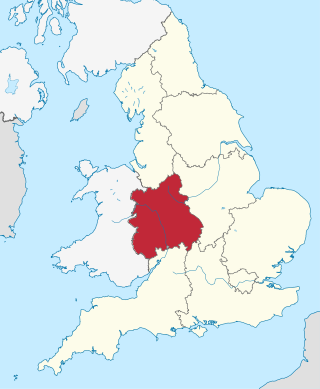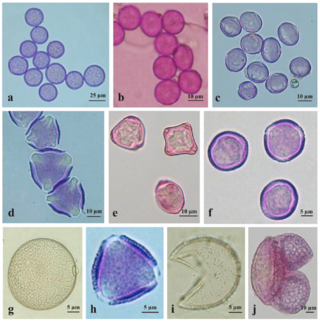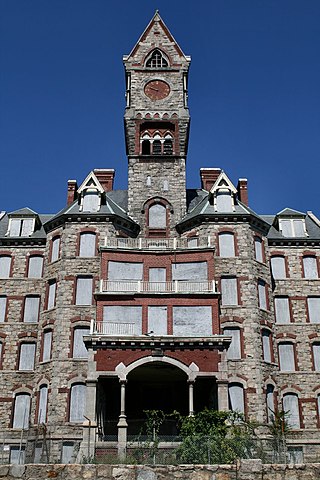
Worcestershire is a county in the West Midlands of England. The area that is now Worcestershire was absorbed into the unified Kingdom of England in 927, at which time it was constituted as a county.

Pollen is a powdery substance produced by seed plants. It consists of pollen grains, which produce male gametes. Pollen grains have a hard coat made of sporopollenin that protects the gametophytes during the process of their movement from the stamens to the pistil of flowering plants, or from the male cone to the female cone of gymnosperms. If pollen lands on a compatible pistil or female cone, it germinates, producing a pollen tube that transfers the sperm to the ovule containing the female gametophyte. Individual pollen grains are small enough to require magnification to see detail. The study of pollen is called palynology and is highly useful in paleoecology, paleontology, archaeology, and forensics. Pollen in plants is used for transferring haploid male genetic material from the anther of a single flower to the stigma of another in cross-pollination. In a case of self-pollination, this process takes place from the anther of a flower to the stigma of the same flower.

The Foreign, Commonwealth & Development Office (FCDO) is a department of the Government of the United Kingdom. Equivalent to other countries' ministries of foreign affairs, it was created on 2 September 2020 through the merger of the Foreign & Commonwealth Office (FCO) and the Department for International Development (DFID). The FCO, itself created in 1968 by the merger of the Foreign Office (FO) and the Commonwealth Office, was responsible for protecting and promoting British interests worldwide.

Weather forecasting is the application of science and technology to predict the conditions of the atmosphere for a given location and time. People have attempted to predict the weather informally for millennia and formally since the 19th century.

The National Hurricane Center (NHC) is the division of the United States' NOAA/National Weather Service responsible for tracking and predicting tropical weather systems between the Prime Meridian and the 140th meridian west poleward to the 30th parallel north in the northeast Pacific Ocean and the 31st parallel north in the northern Atlantic Ocean. The agency, which is co-located with the Miami branch of the National Weather Service, is situated on the campus of Florida International University in Westchester, Florida.
Natural language generation (NLG) is a software process that produces natural language output. A widely-cited survey of NLG methods describes NLG as "the subfield of artificial intelligence and computational linguistics that is concerned with the construction of computer systems than can produce understandable texts in English or other human languages from some underlying non-linguistic representation of information".

The Meteorological Office, abbreviated as the Met Office, is the United Kingdom's national weather service. It is an executive agency and trading fund of the Department for Business, Energy and Industrial Strategy and is led by CEO Penelope Endersby, who took on the role as Chief Executive in December 2018 and is the first woman to do so. The Met Office makes meteorological predictions across all timescales from weather forecasts to climate change.

The West Midlands is one of nine official regions of England at the first level of International Territorial Level for statistical purposes. It covers the western half of the area traditionally known as the Midlands. The region consists of the counties of Herefordshire, Shropshire, Staffordshire, Warwickshire, West Midlands and Worcestershire. The region has seven cities; Birmingham, Coventry, Hereford, Lichfield, Stoke-on-Trent, Wolverhampton and Worcester.

Allergic rhinitis, of which the seasonal type is called hay fever, is a type of inflammation in the nose that occurs when the immune system overreacts to allergens in the air. Signs and symptoms include a runny or stuffy nose, sneezing, red, itchy, and watery eyes, and swelling around the eyes. The fluid from the nose is usually clear. Symptom onset is often within minutes following allergen exposure, and can affect sleep and the ability to work or study. Some people may develop symptoms only during specific times of the year, often as a result of pollen exposure. Many people with allergic rhinitis also have asthma, allergic conjunctivitis, or atopic dermatitis.

The Climatic Research Unit (CRU) is a component of the University of East Anglia and is one of the leading institutions concerned with the study of natural and anthropogenic climate change.

A pollen count is a measurement of the number of pollen grains in a given volume of air. Pollen counts, and forecasts of pollen conditions, are routinely produced and reported to the public because high aerial pollen concentration is associated with increased rates of allergic reaction for those with conditions such as hay fever and asthma. The pollen counted are usually identified to family; particularly families with hyperallergenic pollen and families that are prevalent in the relevant area. Thunderstorm asthma events as well as mild winters with warmer days lead to increases in pollen counts, while colder winters lead to delayed pollen release. Though not pollen, hyperallergenic fungal spores such as those of Alternaria may be counted as well.

The University of Worcester is a public research university, based in Worcester, England. Worcester is the only university based in the counties of Worcestershire and Herefordshire. With a history dating back to 1946, the university began awarding degrees in 1997 and was granted full university status in 2005.
BBC Weather is the department of the BBC responsible for both the preparation and the broadcasting of weather forecasts.
Meteorological Service of New Zealand Limited is the national meteorological service of New Zealand. MetService was established as a state-owned enterprise in 1992. It employs about 300 staff, and its headquarters are in Wellington, New Zealand. Prior to becoming a state-owned enterprise, New Zealand's national meteorological service has existed in a number of forms since the appointment of the country's first Director of Meteorological Stations in August 1861.

Hay fever in Japan is most commonly caused by pollen from Cryptomeria japonica and Japanese cypress, two native Japanese tree species.
An aeroallergen is any airborne substance, such as pollen or spores, which triggers an allergic reaction.

Worcester State Hospital was a Massachusetts state mental hospital located in Worcester, Massachusetts. It is credited to the architectural firm of Weston & Rand. The hospital and surrounding associated historic structures are listed as Worcester Asylum and related buildings on the National Register of Historic Places.

A pollen calendar is used to show the peak pollen times for different types of plant pollen, which causes allergic reactions in certain people.

Alfred William Frankland MBE was a British allergist and immunologist whose achievements included the popularisation of the pollen count as a piece of weather-related information to the British public, speculation regarding the effects of overly sterile living environments, and the prediction of increased levels of allergy to penicillin. He continued to work for a number of years after turning 100.

Chesterford Park Research Station was a former crop protection research centre in Essex, and is now a science park with biotechnology companies.















